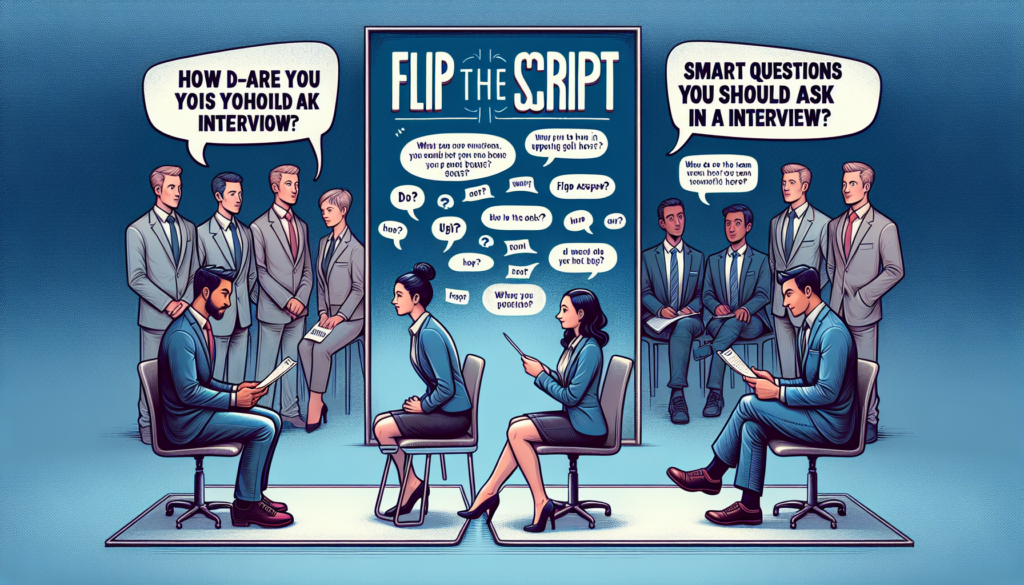Flip the Script: Smart Questions You Should Ask in an Interview (2025 Guide)
Meta: Transform your next job interview by asking these powerful questions. Learn how to impress hiring managers and stand out from other candidates with strategic interview questions.
Ever walked out of an interview wishing you’d asked better questions? You’re not alone! Here’s a shocking stat: 47% of hiring managers immediately reject candidates who don’t ask questions during interviews. But don’t worry – I’m about to show you how to flip the script and turn that dreaded ‘Do you have any questions?’ moment into your secret weapon for landing your dream job!

Why Asking Questions Matters in Job Interviews
When it comes to job interviews, many candidates focus solely on answering questions, but asking thoughtful questions is equally important. The psychology behind this strategy is fascinating. By posing strategic questions, you’re not just gathering information; you’re actively engaging in the conversation and demonstrating your critical thinking skills.
Consider this: when you ask insightful questions, you’re showing the interviewer that you’ve prepared thoroughly and have a genuine interest in the role. This can significantly impact the hiring manager’s perception of you. In fact, studies have shown that candidates who ask well-thought-out questions are 30% more likely to receive job offers.
Remember, an interview is a two-way street. It’s not just about the company evaluating you; it’s also your opportunity to assess if the role and company are the right fit for you.
Essential Questions About the Role
Now, let’s dive into some key questions you should consider asking about the position you’re interviewing for. Start by inquiring about the day-to-day responsibilities. This will give you a clearer picture of what your typical workday might look like.
Next, don’t be afraid to ask about success metrics and expectations. This shows you’re results-oriented and want to understand how your performance will be measured. You might say something like, “What does success look like in this role after 3, 6, and 12 months?”
Growth opportunities are also crucial to discuss. You could ask, “How does this role contribute to the company’s overall goals, and what opportunities for advancement might it lead to?”
Lastly, understanding the team structure and collaboration methods is important. This will help you gauge how you’ll fit into the existing team dynamic.
Company Culture and Environment Questions
When it comes to company culture, it’s essential to get a feel for the work-life balance. You might ask, “How does the company support work-life balance for its employees?” This can lead to a discussion about flexible hours or other policies that promote employee well-being.
In today’s evolving work landscape, inquiring about remote work policies is more relevant than ever. You could ask, “What’s the company’s approach to remote or hybrid work arrangements?”
Don’t forget to ask about the company’s values and mission. This shows you’re interested in aligning with their ethos. For example, “How does the company’s mission translate into day-to-day operations?”
Lastly, team building and social aspects can give you insight into the company’s interpersonal dynamics. You might ask, “What kinds of team-building activities or social events does the company organize?”
Strategic Questions About Company Growth
Asking about the company’s future plans and projections demonstrates your long-term thinking. You could say, “What are the company’s main goals for the next 3-5 years?”
Inquiring about department expansion plans shows you’re interested in the company’s growth trajectory. For instance, “Are there plans to expand this department in the near future?”
Understanding the company’s market position is crucial. You might ask, “How does the company differentiate itself from its competitors in the market?”
Lastly, asking about recent achievements and challenges shows you’re interested in the company’s journey. Try something like, “What’s been the company’s biggest success in the past year, and what challenges are you currently facing?”
Questions That Show You’ve Done Your Research
Demonstrating that you’ve done your homework can really set you apart. Start with industry-specific inquiries that show your knowledge of the field. For example, if you’re in tech, you might ask about their stance on a recent industry trend.
Bringing up recent company news or updates shows you’re actively following their progress. You could say, “I read about your recent product launch. How has the market response been?”
Discussing competitor analysis can showcase your strategic thinking. Try asking, “How does the company plan to address the recent moves by [Competitor X] in the market?”
Inquiring about recent innovations or launches shows you’re forward-thinking and interested in the company’s progress. You might ask, “I’m intrigued by your recent [innovation/launch]. How does this fit into the company’s long-term strategy?”
Career Development and Advancement Questions
Professional growth is a crucial aspect of any job, so don’t shy away from asking about development opportunities. You could inquire, “What kind of professional development programs does the company offer?”
Mentorship can be invaluable in career progression. Ask about any formal or informal mentorship programs available. For instance, “Does the company have a mentorship program for new employees?”
Understanding the resources available for skill development is important. You might ask, “What resources does the company provide for employees looking to expand their skill set?”
Lastly, inquire about promotion pathways to show your ambition and long-term commitment. Try something like, “What does the typical career progression look like for someone in this role?”
Questions to Avoid and Red Flags
While asking questions is important, there are some you should avoid. Salary-related questions can be tricky. It’s generally best to wait for the interviewer to bring up compensation unless they’ve explicitly invited such questions.
Timing is crucial. Avoid asking about vacation policies or time off during the first interview, as this might give the impression that you’re more interested in time away from work than the job itself.
Steer clear of questions that are too personal or obvious. For example, don’t ask the interviewer about their personal life or questions easily answered by a quick look at the company website.
Lastly, avoid questions that show a lack of research. If you ask something that’s clearly stated on their website or in the job description, it might indicate you haven’t done your due diligence.
Remember, the questions you ask can be just as important as the answers you give. They’re your opportunity to showcase your interest, preparation, and strategic thinking. Use them wisely!

Conclusion
Wrap up with empowering message about taking control of the interview process. Include call-to-action encouraging readers to prepare their questions before their next interview.




